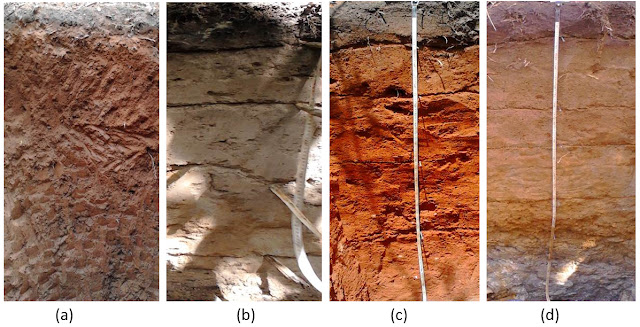Cohort 2 CIRCLE Visiting Fellow
Climate change! Climate change!! Climate change!!! Is soil carbon
storage a solution? Soils play a key role in climate change, as they could act
as sources of or sinks for carbon depending on land-use management. However, sufficient
evidence must be provided for the African continent. On this note, I began my
field trip in southwest Nigeria in search for some evidence. For different
disciplines fieldwork connotes different things. Mine was a real field in
beautifully arranged teak plantations, natural forests, and arable farm lands
in Onigambari and Omo forest reserves in Oyo and Ogun States, respectively. Beautiful
serene environments with clean flowing streams, jumping squirrels, skillfully
carved nests, flocking birds, bustling insects and active worms. Thankfully, no
snakes were on sight. All these scenes were soon masked in what was about to
turn into a very busy soil sampling process. Actually, I was not out there to
enjoy the view only but to collect nearly seven hundred soil samples for
various laboratory analyses. Why and how did I bring this upon myself? To
improve and develop my career capacity provided by rare opportunities such as
the Climate Impact Research Capacity and Leadership Enhancement (CIRCLE) programme
that not only targets early career researchers but also ensures a good
representation of women from different aspects of learning. Also, of the good nature
of my home institution, which continually seeks the growth of her faculty
members.
 |
| Soil profile in arable land use (Cassava farm) Onigambari Forest Reserve, Oyo State, Nigeria |
Storage of carbon (C) in soils, frequently termed ‘soil carbon
sequestration’, is a mitigation strategy for reducing atmospheric greenhouse
gas (GHG) emissions, especially carbon dioxide (CO2), known to
contribute to global warming. So how soils are treated is extremely critical
for climate change studies. Under the CIRCLE award, I will be measuring how
much carbon is stored in soils under different land-use management strategies in
southwest Nigeria, due to insufficient information for the global soil C database and for guiding stakeholders on
appropriate future land use planning and climate change mitigation strategies.
I could not have traversed the forest reserves on
my own without the forest guides who provided direction and guidance in these
terrains. Sampling soils without some past history of land-use engenders
difficulty in data interpretation. Therefore, Dr. Saka Jimoh, a forest
ecologist of the Department of Forest Resources and Management, University of
Ibadan, Nigeria, provided some useful history as well as identifying some of the plant species. Apart from assisting
in sampling, he facilitated the network with the ministry of forestry for
permission to access these reserves. Without a pedologist, identification of
soil types as well as soil characterisation can be frustrating, with various
colours under our foot. So on this trip, I could not have left behind Dr.
Julius Orimoloye, Department of Agronomy, University of Ibadan, Nigeria.
Together with him and some field assistants (graduate students of our
University), the soils were identified, characterised and sampled. With the
unflinching support and resilience of my team the soil sampling was completed
whether it was dusk or in the actual event of heavy rainfall. In the event of
future fieldwork, I will enlist this same team, whose support was total to
achieve the best despite the serious fuel crisis the country was experiencing
at the time of the fieldwork. Although, this fieldwork was more rugged than
previous ones I had engaged in, I have no regrets because it was mission
accomplished. Now, onto lab work at “Mazingira Centre; ILRI’s state-of-art
environmental lab” seeking to provide the evidence……
 |
| Mission accomplished- Some members of the team |










